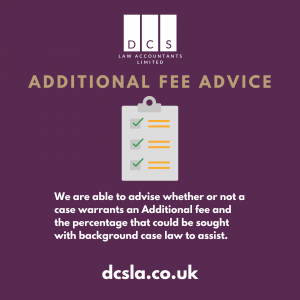
Are you missing out on Additional Fees in Personal Injury Cases?
If you’re doing extraordinary work for clients, shouldn’t you be rewarded with an Additional Fee?
DCS Law Accountant’s resident fee expert, Debbie Shannon, takes a look at Additional Fees and offers some useful advice.
An Additional Fee is a percentage uplift on your fees in the overall Account of Expenses for a personal injury case.
There are seven grounds on which an additional fee can be awarded by the court. They are:
(a) The complexity of the proceedings and the number, difficulty or novelty of the questions raised.
(b) Skill, time, labour, and specialised knowledge of the solicitor
(c) Number and importance of documents prepared or perused
(d) The place and circumstances of the proceedings or in which the work of the solicitor in preparation for, and conduct of, the proceedings have been carried out
(e) Importance of the cause or subject matter to the client
(f) Value amount or value of money or property involved in the cause
(g) The steps taken with a view to settling the proceedings, limiting the matters in dispute or limiting the scope of any hearing
Usually, the two sides will try to come to an agreement on any additional fees payable and their level. If they can’t, then it’s off to court: here, the successful party will ask the court to make a decision and, naturally, the paying party will oppose.
A hearing date will be fixed. Before the hearing, both sides will put forward their argument for, and against an additional fee.
The decision-making process on additional fees changes depending on which court you are in. In the Court of Session, the judge decides on what grounds additional fees will be awarded. At a subsequent Diet of Taxation, the Auditor will decide the percentage uplift awarded. In Sheriff Courts and the All-Scotland Personal Injury Court, the Sheriff decides on the percentage to be awarded.
What percentage uplifts can you expect to see?
That’s one of those ‘It Depends’ questions.
If a Court of Session judge agrees an award on all seven heads, you could expect an uplift of between 200% and 250% to be awarded. Awards in excess of this have been made but are very much an exception rather than the rule.
Grounds (a) Complexity of the case & (b) solicitor knowledge & skill are viewed by some to be the most important, attracting a higher percentage uplift than the remaining grounds.
The percentage uplifts awarded certainly make it worthwhile to push for additional fees.
That’s where we come in. We can look at a case for you and advise whether your work warrants seeking additional fees and what percentage level that could be asked for.
Each case stands on its own merit and it can be difficult to decide whether to seek an opinion from us on additional fees.
Our hints and tips could help you decide:
- If the work you have done is out of the ordinary or exceptionally complex, then additional fees can be sought. However:
- Instructing a lot of Experts does not automatically make a case more complex
- Nor does creating a mountain of documents
- Nor does spending an inordinate amount of time on the case
- If you can evidence the complexity or what has been out of the ordinary, you stand a better chance in an application for additional fees.
- If you choose to only seek additional fees under two heads and you are awarded an uplift for both, then you can go to Taxation and argue to be award additional fees against all possible heads.
- Unfortunately, it doesn’t work the other way. If you seek additional fees on say, five heads, and are only awarded and uplift on two heads, you can’t go to a Taxation and ask for more. Why? Because the court has already considered your arguments and dismissed them.
- It should also be remembered you can’t claim additional fees against work done for a Diet of Taxation.
As we said earlier, each case stands on its own merits. If you’ve got a case where you think additional fees might be justified, talking to us could be very worthwhile.
Contact DCS Law Accountant’s additional fees expert, Debbie Shannon, through Debbie@DCSLA.co.uk to discuss your case.
_______________________________________________________________________________________________________________________________________
 Recovering Medical Expert’s & Agency Fees
Recovering Medical Expert’s & Agency Fees
Every Solicitor will have experienced (at one time or another) challenges on medical expert’s fees or medical agency fees that they have incurred in a case. The very point of instructing a medical agency is to reduce the administration in acquiring medical records and expert evidence. However, Solicitors can often be left at the conclusion of the case with a choice to make: accept a reduced offer for medical fees and take the hit or engage in what can be a laborious process debating the reasonableness of any expert/agency fee incurred.
We provide some tips on the main areas of contention and how to recover your expert medical fees.
Liaise with your Medical Expert/Agency
Considered whether your expert or agency is over-charging?
There seems to be more competition in the medical expert market, depending on the type of expert required. Let’s take for example, a GP or Orthopaedic expert. The hourly rates charged should not be so out of the norm as to be flagged as unreasonable by the paying party. The best pro-active action to take is by maintaining a database of preferred medical experts/agencies that you know provide a cost-effective service.
Is there such a thing as an ‘appropriate uplift’ for a Medical Agency?
We know that the fees charged by an expert instructed through a medical agency includes an uplift from the intermediary agency. It is not an uncommon approach from a paying party in Scotland to ask for an abatement in full of the agency administration fees charged. However, in England if an agency is obtaining medical records on your behalf, the agency fee for their direct costs and a small administrative fee can normally be recovered.
Are you required to provide a breakdown of the Medical Agency fee?
Sometimes it is simply not possible to obtain a breakdown from a medical agency and in these circumstances, the best action if challenged is to request from the medical agency a copy of the invoices of a) any expert that provided a report and b) for medical records. It should however be kept in mind that if agreement cannot be reached and the point is taken to taxation, an Auditor would likely expect to see the breakdown.
Is a Medical Expert’s fee damages or expenses?
Sounds an obvious question but sometimes a medical expert’s fee may be claimed as part of expenses when they are actually part of treatment and form part of damages. To claim as expenses would be a double recovery. An example would be CBT sessions or a medical scan. The important question is what was the purpose of the scan/sessions? If the scan was recommended as part of the reporting process or to help finalise a report, it is an expense that can be recovered.
Feel free to contact us with any of your law accountancy questions at DCS Law Accountants debbie@dcsla.co.uk
Email us
debbie@dcsla.co.uk
